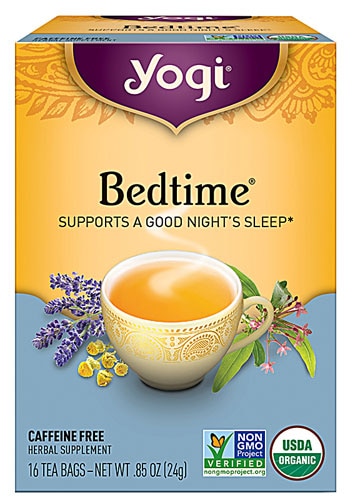For millennia,
herbal tea has been sipped round the world as a natural sleep remedy. Modern research also backs herbal teas’ ability to aid sleep. The herbs used in herbal teas are designed to soothe the savagely restless mind, boost relaxation and ease insomnia. Many of the herbs that comprise calming teas do so by increasing or modifying specific neurotransmitters that are involved in initiating sleep. Some of the herbs may help you fall asleep faster, decrease nighttime awakenings and improve your overall sleep quality.
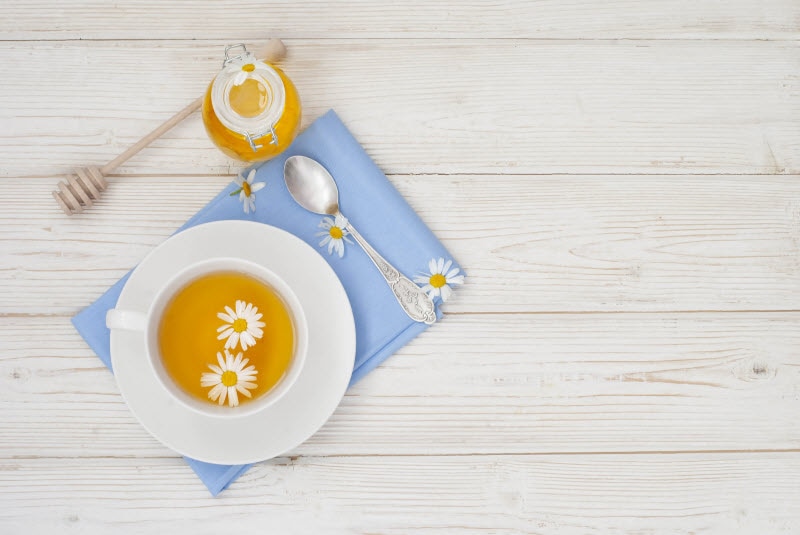
If you have tried blackout curtains, aromatherapy, white noise—and you don’t want to turn to sleep meds—try treating yourself to a simple but humble cup of herbal tea. Note that they affect people differently and might not make a noticeable impact on your ability to relax. The evidence of their benefits in people is often inconsistent. But since they do no harm, feel free to experiment with different herbs. See if you can empirically notice a sense of soothing.
How tea supports sleep
A common way to treat insomnia is to balance your serotonin levels. Many of the herbs below are high in tryptophan, which helps improve serotonin production. Other herbs, such as chamomile and valerian, work by binding to GABA receptors in the brain, helping to induce relaxation.
Top 5 Herbal Teas for Sleep
Valerian
What it is: Valerian (
Valeriana officinalis), a member of the Valerianaceae family, is a perennial plant native to Europe and Asia but now plentiful in North America. It has a strong, earthy odor that is quite distinctive.
Historical usage: Valerian has been used as a medicinal herb since the ancient civilizations of Greece and Rome. In the 16th century, it was used for nervousness, trembling, headaches and heart palpitations. During World War II, it was used in England to relieve the stress of air raids.
†
How it works: While researchers aren’t entirely clear on how valerian works, one theory is that it increases levels of a neurotransmitter called gamma-aminobutyric acid (GABA). When GABA is abundant, it can increase sleepiness. Valerian root is effective as a sleep aid due to the two naturally occurring sedatives within it called
valepotriates and sesquiterpenes.
†
Try it: Yogi Bedtime tea combines two star sleep aids, passionflower and valerian root, to help you go double down on counting zzzs.
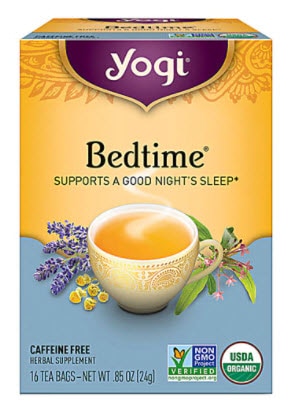
Ashwagandha
What it is: An adaptogen, ashwagandha helps the body adapt to stress and thereby enhance general wellbeing. It is an erect, greyish, evergreen shrub with inconspicuous yellow or greenish flowers followed by small, spherical, orangish-red berries containing yellow, kidney-shaped seeds.
Historical usage: For thousands of years, people have used the roots and orange-red fruit of ashwagandha for strengthening, immune building and increasing vitality. The herb is also known as Indian ginseng or winter cherry.
†
How it works: Research has found that ashwagandha may help people fall asleep faster, spend more time asleep, and experience
better sleep quality. Ashwagandha’s main active ingredients are withanolides, believed to carry a host of benefits including the ability to ease stress. Ashwagandha may also work on GABA receptors, which are known to play a big role in sleep-wake circuit.
†
Try it: Yogi Tea Sweet Clementine Stress Support contains ashwagandha, part of its proprietary formula designed to ease tension and help your body achieve its natural equilibrium.

Chamomile
What it is: Chamomile comes from the Greek words
chamos (ground) in reference to its low-growing characteristics and
melos (apple), in reference to the apple scent of fresh chamomile blossoms. The dry flower of chamomile contains approximately 120 secondary metabolites, comprising
terpenoids and
flavonoids, which contribute to its health-supporting properties.
†
Historical usage: Chamomile is one of the most ancient medicinal herbs known to mankind. As a tea, it has long been used, as a traditional folk remedy, for a wide range of health issues, including anxiety.
†
How it works: Flowers of the chamomile plant have been used for many years for variety of issues, including poor sleep. Chamomile contains multiple active chemical compounds, including one called apigenin that has a
mild tranquilizing effect once it binds to benzodiazepine receptors in the brain.
†
Try it: Y
ogi Comforting Chamomile packs a generous dose of chamomile into every bag, so you can drift off to dreamland without drama.
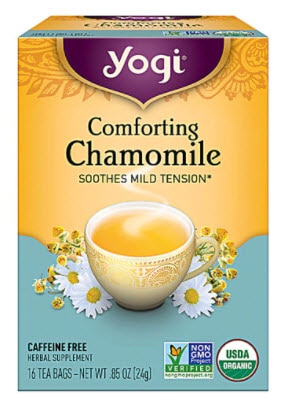
Kava
What it is: Kava—or kava kava—is a root of
Piper methysticum—a type of plant found in the islands of the Pacific Ocean. Its name literally means “intoxicating pepper.”
Historical usage: People who live on Pacific islands like Fiji and Tonga have used kava for hundreds of years in social ceremonies and traditional medicine.
How it works: Kava is rich in kavalactones, a class of compounds found to possess sedative properties. Kavalactones are thought to play a key role in kava's possibly sleep-promoting effects.
†
Try it: Yogi Kava Stress Relief combines Kava with warming spices to give you an earthy, delicious brew perfect for bedtime.
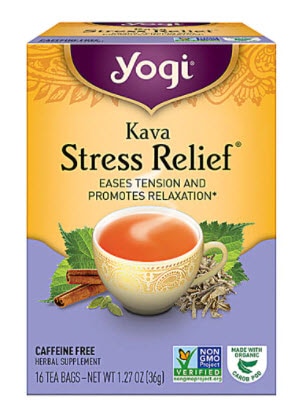
Lavender
What it is: Originally native to the Mediterranean region, but now grown worldwide, lavender plants are small, branching and spreading shrubs with grey-green leaves and long flowering shoots.
Historical usage: Lavender use has been documented for over 2500 years. The ancient Egyptians used lavender for mummification and perfume. In many cultures, lavender was and still is used to scent clothing, perfume the air and ward off infection and heal wounds.
†
How it works: Lavender works with the neurotransmitter GABA to quiet the mind and promote relaxation.
†
Try it: Yogi Honey Lavender Stress Relief is a fragrant, calming blend of lavender and several other sleep aids, designed to lull you to la la land without a hitch.
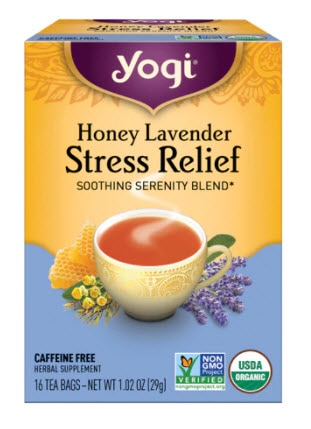 †These statements have not been approved by the Food and Drug Administration. These products are not intended to diagnose, treat, cure or prevent disease.
†These statements have not been approved by the Food and Drug Administration. These products are not intended to diagnose, treat, cure or prevent disease.
 If you have tried blackout curtains, aromatherapy, white noise—and you don’t want to turn to sleep meds—try treating yourself to a simple but humble cup of herbal tea. Note that they affect people differently and might not make a noticeable impact on your ability to relax. The evidence of their benefits in people is often inconsistent. But since they do no harm, feel free to experiment with different herbs. See if you can empirically notice a sense of soothing.
If you have tried blackout curtains, aromatherapy, white noise—and you don’t want to turn to sleep meds—try treating yourself to a simple but humble cup of herbal tea. Note that they affect people differently and might not make a noticeable impact on your ability to relax. The evidence of their benefits in people is often inconsistent. But since they do no harm, feel free to experiment with different herbs. See if you can empirically notice a sense of soothing.
 †These statements have not been approved by the Food and Drug Administration. These products are not intended to diagnose, treat, cure or prevent disease.
†These statements have not been approved by the Food and Drug Administration. These products are not intended to diagnose, treat, cure or prevent disease.



